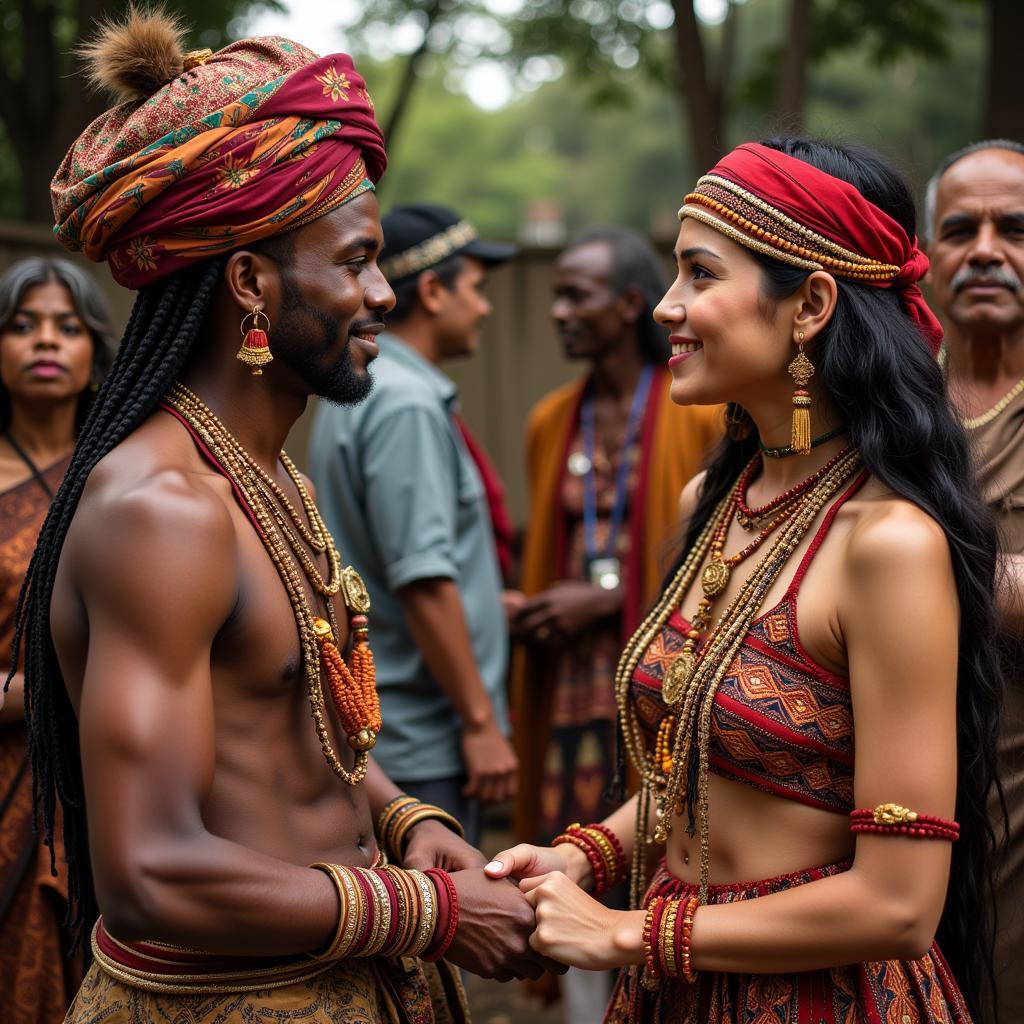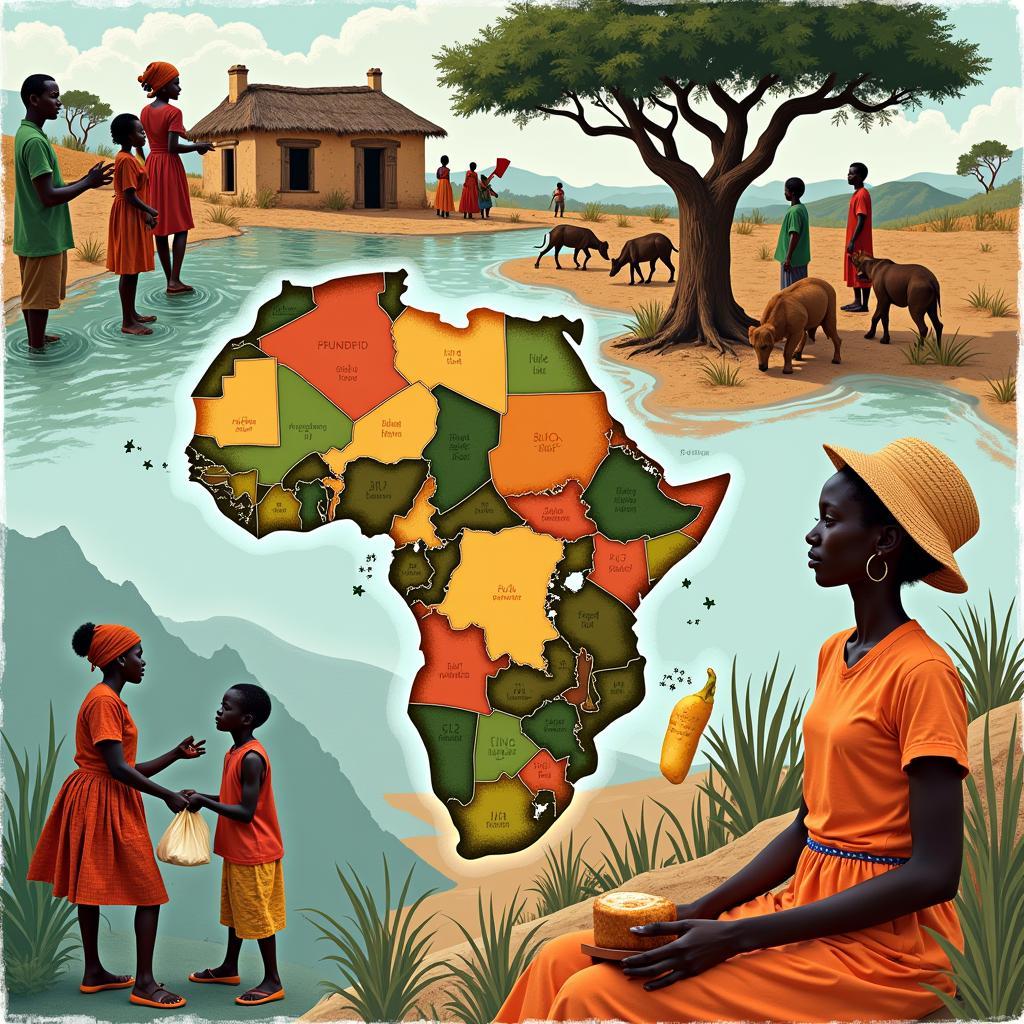African Dresses for Ladies: A Celebration of Culture, Style & Elegance
African Dresses For Ladies are more than just garments; they are vibrant expressions of cultural heritage, artistic creativity, and individual style. From the bold patterns of Ankara to the flowing silhouettes of Kente cloth, African fashion bursts with life, telling stories of tradition and modernity intertwined. This exploration delves into the captivating world of African dresses, celebrating their diversity, elegance, and global appeal.
The Tapestry of Tradition: Exploring Different Styles of African Dresses
Across the vast African continent, each country boasts a unique sartorial heritage, resulting in a breathtaking array of dresses for ladies. Let’s journey through some of the most iconic styles:
- Kente: Originating from Ghana, Kente cloth is renowned for its intricate geometric patterns, vibrant colors, and rich symbolism. Traditionally woven on narrow looms by skilled artisans, Kente dresses exude regality and are often worn for special occasions and celebrations.
- Ankara: This versatile fabric, also known as African wax print, is celebrated for its bold and colorful patterns. Originally inspired by Indonesian batik, Ankara has been embraced across Africa, giving rise to a myriad of dress styles, from figure-hugging silhouettes to flowing maxi dresses.
- Dashiki: Often characterized by loose-fitting tunics, the Dashiki originated in West Africa and has become a powerful symbol of pan-African identity. Modern interpretations of Dashiki dresses for ladies showcase the versatility of this style, with variations in length, embellishments, and necklines.
- Boubou: This flowing, wide-sleeved robe is popular across West Africa, offering both comfort and elegance. While traditionally worn by men, the Boubou has evolved into a stylish choice for women, often crafted from luxurious fabrics and adorned with intricate embroidery.
Beyond the Fabric: The Significance of African Dresses
Beyond their aesthetic appeal, African dresses for ladies carry profound cultural and social significance:
- Storytellers of Identity: Each fabric, color, and pattern often holds specific meanings, reflecting tribal affiliations, social status, or personal beliefs. Wearing traditional dresses becomes a way to connect with ancestral roots and showcase cultural pride.
- Celebrations of Womanhood: Many African dresses are designed to accentuate the feminine form, celebrating curves and exuding confidence. From the figure-hugging styles of the Kitenge to the flowing elegance of the Iro and Buba, these dresses empower women to embrace their beauty.
- Expressions of Creativity: African fashion is dynamic and ever-evolving. Contemporary designers are constantly pushing boundaries, fusing traditional techniques with modern silhouettes, and incorporating sustainable practices. This innovative spirit has propelled African dresses onto the global fashion stage.
Choosing the Perfect African Dress: A Guide for Every Occasion
With such a stunning array of options, selecting the perfect African dress might seem daunting. Here are some tips to guide your choice:
- Occasion: Consider the event you’re dressing for. A formal occasion might call for a regal Kente dress, while a casual outing could be perfect for a vibrant Ankara sundress.
- Body Type: Embrace your unique silhouette and choose a dress style that flatters your figure. From empire waistlines to A-line cuts, there’s a perfect dress for every body type.
- Personal Style: Don’t be afraid to experiment and infuse your personality into your choice. Whether you prefer bold prints, minimalist designs, or statement accessories, let your individuality shine through.
African Dresses in the Global Fashion Landscape
African fashion, with its vibrant colors, bold patterns, and unique designs, has captivated the global fashion scene. Here’s how it’s making its mark:
- Runway Revolution: From New York to Paris, African designers are making waves on international runways, showcasing the creativity and craftsmanship of the continent.
- Celebrity Embrace: Global icons and influencers have embraced African dresses, bringing increased visibility and appreciation for this rich fashion heritage.
- Sustainable Fashion: Many African designers are championing sustainable practices, using locally sourced materials and traditional techniques, aligning with the growing global demand for ethical fashion.
Conclusion
African dresses for ladies are a testament to the continent’s rich cultural tapestry, artistic ingenuity, and timeless elegance. From the vibrant patterns of Ankara to the regal flow of Kente, these dresses tell stories, empower women, and celebrate the beauty of diversity. As African fashion continues to captivate the world, embracing these garments becomes a celebration of cultural heritage and individual style.
FAQ
- What is the best fabric for an African dress? There is no single “best” fabric as it depends on personal preference and occasion. Common choices include Ankara, Kente, lace, and silk.
- Are African dresses only for special occasions? Absolutely not! While some styles like Kente are traditionally reserved for celebrations, fabrics like Ankara are incredibly versatile and can be styled for everyday wear.
- Where can I find authentic African dresses? Online marketplaces, African boutiques, and even local markets in African communities are great places to start your search.
Need Help?
Have more questions about African Dresses for Ladies? Contact us at:
Phone Number: +255768904061
Email: kaka.mag@gmail.com
Address: Mbarali DC Mawindi, Kangaga, Tanzania
We have a 24/7 customer service team ready to assist you.

